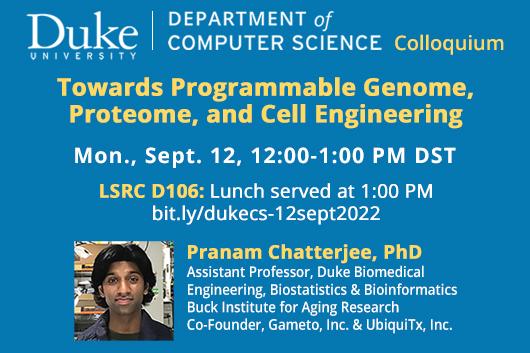Towards Programmable Genome, Proteome, and Cell Engineering

In this faculty seminar, we will explore the integration of state-of-the-art computational and experimental methodologies to generate programmable protein-based platforms for applications in genome, proteome, and cellular engineering. First, to broaden the targeting range of CRISPR for RNA-guided genome editing, we devise a suite of unique metagenomic and structure-based algorithms to discover, characterize, and engineer three robust Cas9 enzymes, ScCas9, Sc++, and iSpyMac, with more flexible targeting and enhanced editing capabilities, and finally engineer a Cas9 with completely unconstrained genomic accessibility. Next, we extend the programmability of CRISPR-Cas9 to the nascent field of proteome editing, by employing both structure- and sequence-based generative models to develop a unique peptide-guided protein degradation platform, enabling selective targeting and removal of viral, oncogenic, and other pathogenic proteins. Finally, we describe our current efforts to train graph theory-based pipelines to prioritize "central" transcription factors of cell differentiation. We leverage combinatorial screening and high-throughput sequencing of these factors in pluripotent stem cells to efficiently generate user-specified cell types of interest, with particular focus on ovarian cell types, including oocytes and granulosa cells. Overall, we envision that our transcription factor-guided cell differentiation protocols will enable the programmable differentiation of any cell type of interest, thus enabling key advances in regenerative and reproductive medicine.
Dr. Pranam Chatterjee is an Assistant Professor of Biomedical Engineering at Duke University. Research in his Programmable Biology Group exists at the interface of computational design and experimental engineering, specifically employing state-of-the-art algorithmic methods to engineer programmable proteins for applications in genome, proteome, and cell engineering. A PhD graduate of the MIT Media Lab, he developed robust genome editing technologies that represent some of the broadest, safest, and most effective CRISPR enzymes to date. More recently, Dr. Chatterjee's research has extended to the emergent field of "proteome" editing, where his team leverages structure and sequence-based design to engineer potent peptide fusions that target and degrade pathogenic proteins, including those implicated in viral diseases and cancer.







